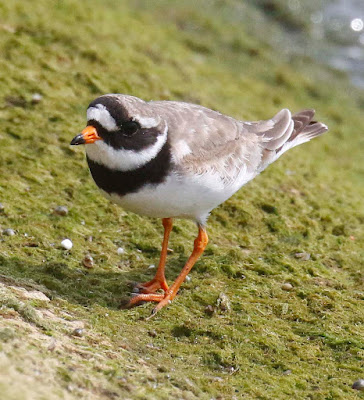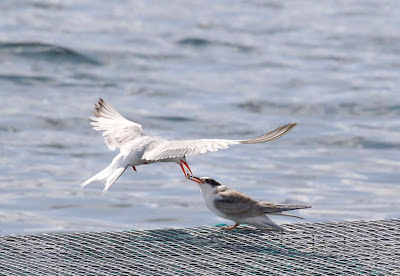Today the rain abated mid morning and despite a brisk wind it turned into a warm, sunny and very pleasant day. A wander up the causeway brought the discovery of two Ringed Plovers, pitter pattering along the shoreline. Their manner of feeding is utterly distinctive, a few quick steps and then a downwards tilt of head and body to seize something, then head up, a seconds only glance around to re-assure all is well before the process is repeated.
 |
| The two Ringed Plovers |
Both were adults, their sand coloured upperpart plumage showing distinct signs of wear with many frayed feathers. One still looked the part though, in splendidly marked plumage and compared to its companion appeared very bright.The other was duller with a less well marked bill but regardless the two of them kept close company, two small waders putting down here to refuel and rest and finding each other's company re-assuring in the atypical environment of an inland reservoir.
I speculated as to where they might have come together. Could they be a returning pair, maintaining their bond while journeying south from their breeding grounds or had they met up on some far distant shore and carried on their journey together, maybe even met high in the sky as they travelled over a foreign land? Would they carry on their migration together or depart separately?Who knows? There are always questions.
The duller bird squatted on the sun warmed concrete, possibly tired and taking some rest, as and when it could. Its companion would keep an eye out and raise the alarm if necessary.
I enjoyed the moment but soon the plovers were moving off and I too roused myself and headed in the opposite direction. At the far end of the causeway Common Terns have adopted the line of straw filled wire cages that act as filtration for the water being pumped from the River Thames into the reservoir.Their numbers are slowly building and today twenty five are perched on the wire mesh. Amongst them there are at least half a dozen juveniles, which idle away the hours on the cages, waiting while their parents go fishing for them on the reservoir.When a juvenile sees its parent approaching with a fish it sets up a beseeching, repetitive calling and the parent flies in to deliver the fish without settling. The process is over in seconds as the fish is transferred from one bill to another. The camera captures perfectly the grace of the adults flight as it delivers the fish and then rises and sweeps away to find yet another victim for its demanding offspring.
The juveniles are perfectly able to fish for themselves and regularly take feeding flights around this corner of the reservoir but if their parents are still willing to bring food then why make too much effort.The time will come, all too soon, when life will get a whole lot more perilous as the young tern's leave the reservoir and, having to fend for themselves, head for their winter home off the coast of Africa.
But for now the sun is shining, it's a warm wind that is blowing and food is plentiful .............................
















No comments:
Post a Comment